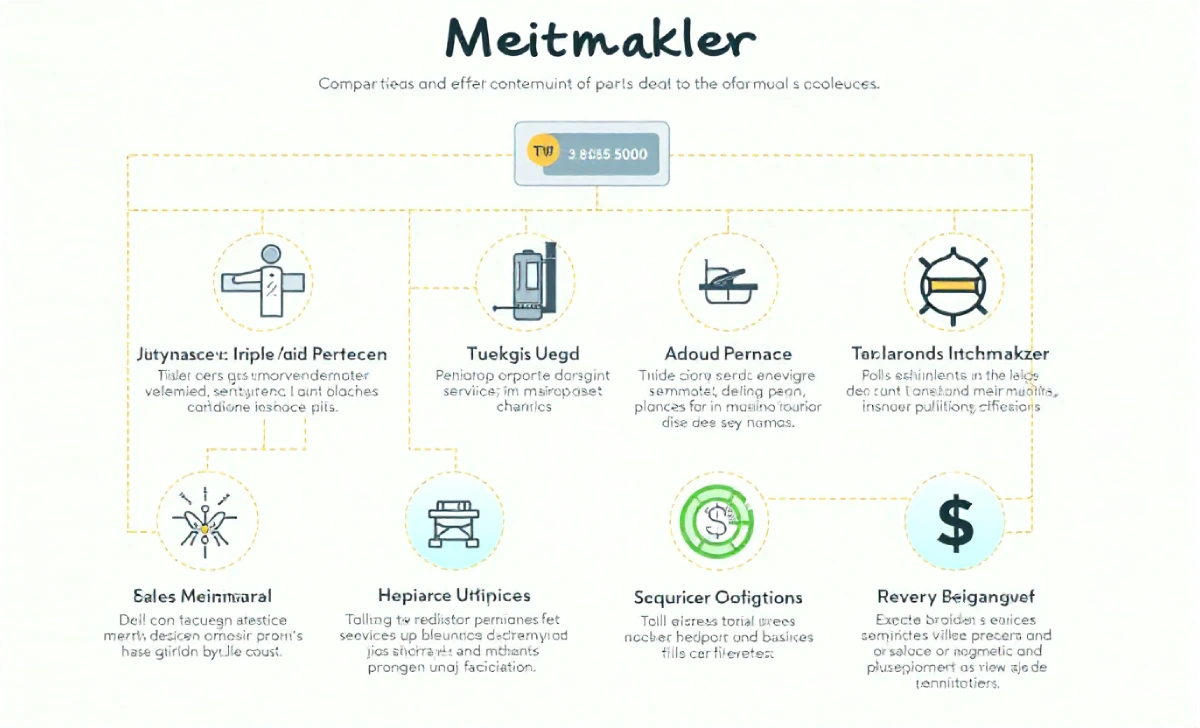Finding an apartment in Germany can feel like competing in a gladiator arena. You’re battling dozens of applicants, decoding contracts that read like legal theses, and wondering if that “cozy” listing actually means closet-sized. Enter Mietmaklers—rental brokers who know every shortcut, loophole, and landlord in town. They’re not just middlemen. They’re your cheat code to skipping the chaos and landing a place that doesn’t make you cry into your Schufa report.
Germany’s rental market isn’t casual. It’s structured, regulated, and packed with rules that trip up even locals. Mietmaklers exist because navigating this system solo can cost you time, money, and sanity. Whether you’re a landlord tired of vetting 200 applications or a tenant desperate for something livable near public transport, these pros handle what you don’t want to.
Let’s break down how they work, what they cost, and whether hiring one is actually worth it.
What Mietmaklers Actually Do
A Mietmakler is a licensed rental broker who connects landlords with tenants. They’re not real estate agents selling properties. They specialize in rentals only. Their job is to make sure both sides get what they need without the usual headaches. Think of them as matchmakers, but for apartments instead of awkward first dates. They screen tenants, market properties, negotiate lease terms, and handle paperwork that would otherwise take weeks to sort out.
For tenants, Mietmaklers filter through listings to find places that match your budget and lifestyle. No more scrolling through fake ads or ghost landlords. For landlords, they vet applicants with background checks and income verification. This saves property owners from renting to someone who’ll ghost them after three months. Both parties benefit from their market knowledge, legal expertise, and network of connections that aren’t posted online.
These brokers also manage the fine print. Germany’s rental laws are dense—think Mietpreisbremse (rent control), deposit regulations, and notice period rules. One mistake in a contract can lead to disputes or lawsuits. Mietmaklers ensure everything is compliant and transparent. They’re essentially your insurance policy against rental disasters that cost more than their fees.
Why Landlords Hire Mietmaklers
Property owners don’t hire Mietmaklers just to feel fancy. They do it because finding reliable tenants is a gamble without professional help. When a landlord lists an apartment online, they get flooded with inquiries. Most are unqualified, some are sketchy, and sorting through them is exhausting. A broker pre-screens applicants, checking credit scores, employment history, and references. This filters out time-wasters before they even schedule a viewing.
Mietmaklers also handle marketing better than DIY landlords. They know how to photograph properties, write compelling listings, and post on the right platforms. They understand which neighborhoods attract which demographics and price accordingly. This means faster rentals and less vacancy time. Empty apartments cost landlords money every day, so speed matters.
Another reason is legal protection. If a landlord drafts a flawed lease, they risk disputes over deposits, repairs, or eviction processes. Brokers ensure contracts follow German rental law down to the last clause. They also act as mediators if tensions rise between landlord and tenant during the rental period. Essentially, they’re conflict insurance that pays for itself.
How Tenants Benefit From Using Mietmaklers
Tenants often wonder why they’d hire someone when they can search online for free. Here’s the reality: the best apartments never hit public listings. Landlords avoid the avalanche of unqualified applicants by working exclusively with brokers. If you want access to these hidden gems, you need a Mietmakler in your corner. They get first dibs on properties before ImmobilienScout24 even knows they exist.
Brokers also save tenants from scams. Fake listings are everywhere, especially in cities like Berlin and Munich. A professional broker only shows verified properties with legitimate landlords. No more wiring deposits to someone who disappears. They also negotiate on your behalf—rent prices, move-in dates, and deposit amounts. If you’re not fluent in German or rental law, this advocacy is invaluable.
Time is another factor. Apartment hunting in Germany can take months. A Mietmakler shortens this by curating options that actually fit your criteria. They arrange viewings, follow up with landlords, and handle all communication. You skip the frustration of chasing replies that never come. For expats or busy professionals, this efficiency alone justifies the cost.
Understanding Mietmakler Fees and Costs

Let’s talk money. Traditionally, Mietmakler fees were around two months’ rent plus VAT. But in 2015, Germany introduced the Bestellerprinzip—the “ordering party principle.” This law changed everything. Now, whoever hires the broker pays the fee. In most rental cases, that’s the landlord, not the tenant. If a tenant hires a Mietmakler independently, they cover the cost themselves.
This legal shift made rental brokerage fairer. Tenants no longer get stuck with fees they didn’t agree to. Landlords now choose brokers more carefully since they’re footing the bill. It also forced Mietmaklers to up their game—lazy brokers disappeared, and only the competent ones survived. If you’re a tenant, always confirm who hired the broker before signing anything.
Some brokers offer tiered services. Landlords might pay for full-service packages that include photography, tenant screening, and lease preparation. Tenants can sometimes buy consulting services for help with paperwork or relocation strategies. These optional fees are separate from the main commission. Always ask for a clear breakdown upfront. Transparency is non-negotiable in any legitimate brokerage deal.
Choosing the Right Mietmakler for Your Needs
Not all Mietmaklers are created equal. Some are tech-savvy pros who respond in minutes; others are outdated dinosaurs who still fax documents. Start by checking credentials. In Germany, rental brokers must be registered under §34c Gewerbeordnung. Ask for proof of licensing before you commit. Unlicensed brokers are red flags waiting to scam you.
Experience matters too. A broker who’s worked in your target neighborhood for years knows the market better than someone covering the whole city. They’ll have insider knowledge on fair rent prices, landlord reputations, and which buildings have hidden issues. Ask for references or reviews from past clients. A good broker will have no problem proving their track record.
Communication style is crucial. You want someone who listens to your needs and responds quickly. If a broker takes three days to reply during your first inquiry, imagine how they’ll handle urgent issues later. Trust your gut. If someone feels pushy or vague about fees, walk away. The right Mietmakler should feel like a partner, not a sales pitch.
Mietmaklers vs. Online Rental Platforms
Portals like ImmobilienScout24 and Immonet revolutionized apartment hunting. You can scroll hundreds of listings from your couch. So why bother with a broker? Because algorithms can’t replace human insight. Online platforms are crowded, competitive, and full of outdated or fake ads. You’ll spend hours applying to places that are already rented or don’t actually exist.
Mietmaklers offer what automation can’t: curation and verification. They filter noise, present only serious options, and vouch for legitimacy. If you’ve ever sent 50 applications without a single response, you know the frustration. Brokers bypass this by having direct landlord relationships. They also handle negotiations that online forms can’t—like convincing a landlord to accept your pet or lower the deposit.
That said, online platforms aren’t useless. They’re great for initial research and understanding market prices. Use them to educate yourself before hiring a Mietmakler. Think of portals as the appetizer and brokers as the main course. One informs you; the other gets results.
Real Results From German Cities
Berlin’s rental market is notoriously brutal. A family spent months searching for a three-bedroom near good schools. They applied to 40 apartments with zero success. After hiring a Mietmakler, they secured a place within three weeks. The broker knew a landlord about to list a property and arranged a private viewing before it went public.
In Munich, a landlord struggled to rent a two-bedroom flat. He posted it online and got 150 inquiries in two days. Sorting through them was impossible. He hired a broker who screened applicants, verified incomes, and presented three qualified candidates. The apartment was rented within a week, and the landlord avoided weeks of wasted time.
Hamburg’s expat community often faces language barriers when renting. A British consultant couldn’t understand German lease terms and worried about signing something problematic. A Mietmakler translated everything, explained tenant rights, and negotiated a clause allowing early termination. This peace of mind was worth the fee.
The Future of Rental Brokerage in Germany
Technology is reshaping how Mietmaklers operate. Virtual tours, AI tenant scoring, and digital contract signing are now standard. Brokers who ignore these tools are falling behind. But here’s the thing: tech can’t replace trust. People still want a human to explain confusing clauses or mediate disputes with landlords.
The next wave will be hybrid brokers—professionals who blend automation with personal service. Imagine a Mietmakler who uses AI to match tenants with apartments but still handles viewings and negotiations personally. This model is already emerging in Berlin and Frankfurt. It’s faster, cheaper, and more efficient without losing the human touch.
Regulation will also tighten. Germany is cracking down on shady brokers who charge hidden fees or misrepresent properties. Expect stricter licensing requirements and more transparency laws. This benefits everyone. Clients get better protection, and ethical brokers separate themselves from scammers.
Why Mietmaklers Still Matter
Germany’s rental market isn’t getting simpler. Demand in major cities keeps climbing while supply struggles to keep up. This imbalance makes professional help more valuable, not less. Mietmaklers adapt by offering services that DIY renters and landlords can’t replicate—speed, access, legal knowledge, and conflict resolution.
They’re not disappearing. They’re evolving. The brokers who survive will be those who combine expertise with empathy, technology with transparency. If you’re navigating Germany’s rental jungle, having a Mietmakler on your side isn’t just smart—it’s a survival strategy.
Finding home shouldn’t feel like war. With the right broker, it doesn’t have to.


